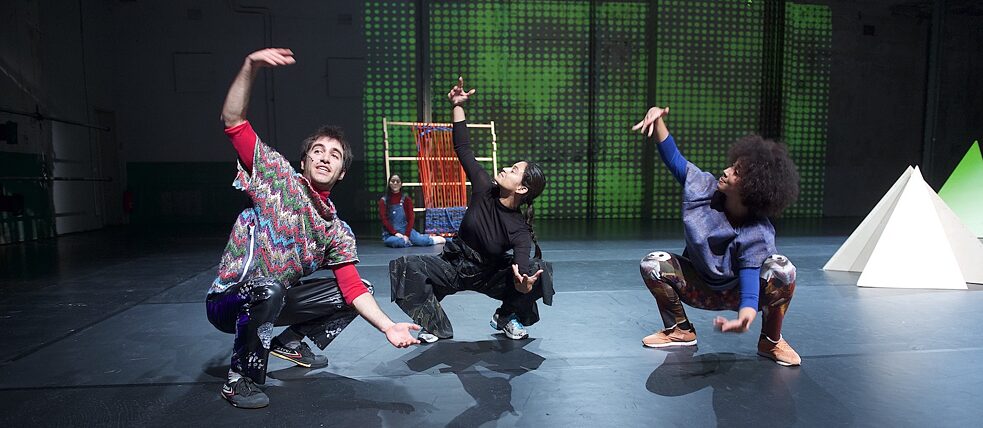Olivia Hyunsin Kim
Self-Empowerment of the Body

Choreographer and performer Olivia Hyunsin Kim explores the topics of body, postcolonialism and feminism under the pseudonym ddanddarakim. The focal point of her work is bodies impacted by discrimination and their self-empowerment.
By Ceyda Nurtsch and Olivia Hyunsin Kim
Behind a white screen, in a darkened room, stands the dancer in silhouette. Above her in black lettering are the words “It’s a child”, which at first are slowly sliding down towards her, then falling faster and with increasing force, until finally they tumble down and kill her. The body impacted by discrimination, feminism and identity construction from a postcolonial perspective are the central themes of the creative work by choreographer and performer Olivia Hyunsin Kim – including in this performance entitled Like Daughter, like Mother.
In her show History has failed us, but… she looks at physical forms of protest and uses resistance movements like the Gezi protests in Turkey and the Candlelight Demonstrations in South Korea as a starting point from which to seek new strategies for personal self-empowerment that society views as “different” or “other”.
Turning the tables
Olivia Hyunsin Kim grew up in Siegen and Anyang in South Korea. She studied German at Seoul National University, as well as dance and choreography at the University of Hawai’i at Manoa, Falmouth University in Cornwall, the Institute of Applied Theatre Studies in Gießen, and the University of Music and Performing Arts in Frankfurt. Today she works under the pseudonym ddanddarakim in various combinations with artists from different backgrounds and using cross-genre media.
But actually she had a different plan. She used to work as an actor but gave it up because the stereotypical typecasting bothered her, she says. “It’s a huge problem that yet again reproduces an image related to “othering” and the violence associated with it,” she explains.
A white soldier goes to an “exotic” Asian country where he meets an Asian virgin and marries her; she gets pregnant, and he leaves her. But she can’t forget him, in the end she gives him her son and commits suicide: this old narrative is still present in the performing arts, for example in the opera Madame Butterfly or the hit musical Miss Saigon, says Kim. She addresses this theme in her performance Miss Yellow and Me – I wanna be a musical – a musical talent show in which the audience chooses the next “Miss Yellow”. “But I didn’t just want to highlight the problems. The audience becomes increasingly involved through humour and the worsening situation, resulting in the absence of a fourth wall – in other words there is nothing separating the audience from the stage. The tables are turned. Empowerment!” she says. She received the Amadeu Antonio Prize for this work in 2019.
Comments
Comment